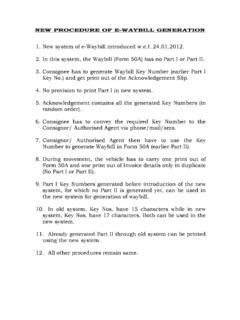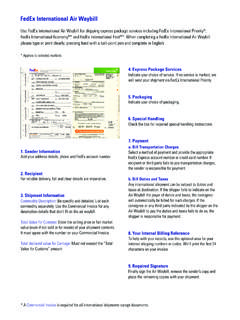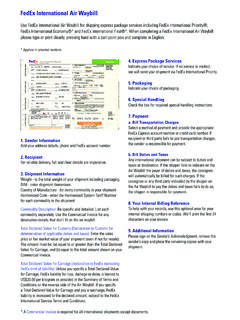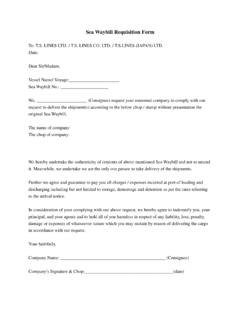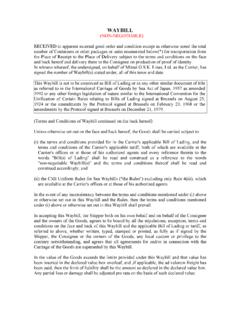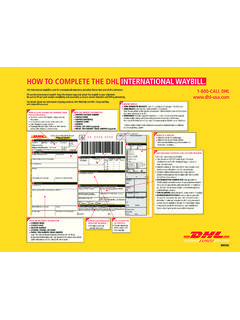Transcription of WAYBILL NON-NEGOTIABLE (2013) FACE - JIFFA
1 JAPAN INTERNATIONAL FREIGHT FORWARDERS ASSOCIATION INC. ( JIFFA ) WAYBILL NON-NEGOTIABLE ( 2013 ) FACE Received by the Carrier from the Shipper in apparent good order and condition unless otherwise indicated herein, the Goods, or the container(s) or package(s) said to contain the cargo herein mentioned, to be carried subject to all the terms and conditions appearing on the face and the back of this WAYBILL by the vessel named herein or any substitute at the Carrier's option and/or other means of transport, from the place of receipt or the port of loading and to the port of discharge or the place of delivery shown herein and there to be delivered unto the consignee named herein, or his authorized agent, on production of such proof of identity as required by the Carrier. In accepting this WAYBILL , the Shipper agrees to be bound by all the stipulations, exceptions, terms and conditions on the face and back hereof and of the Carrier s applicable tariff, whether written, typed, stamped or printed, as fully as if signed by the Shipper, any local custom or privilege to the contrary notwithstanding, and agrees that all agreements or freight engagements for and in connection with the carriage of the Goods are superseded by this WAYBILL .
2 Moreover, the Shipper accepts the said stipulations, exceptions, terms and conditions not only on his own behalf but on behalf of the Consignee and the Owner of the Goods and the Shipper warrants that he has the authority to do so. Particulars furnished by Merchant. All descriptions contained herein considered unknown to the Carrier. Merchant s Declared Value (see Clauses 18 & 23): Note: The Merchant's attention is called to the fact that according to Clauses 18 & 23 of this WAYBILL , the liability of the Carrier is, in most cases, limited in respect of loss of or damage to the Goods. In witness whereof, the undersigned, has signed the number of the WAYBILL (s) stated herein, all of this tenor and date. An enlarged copy of back clauses is available from the Carrier upon request. BACK JAPAN INTERNATIONAL FREIGHT FORWARDERS ASSOCIATION INC. ( JIFFA ) TERMS AND CONDITIONS OF NON-NEGOTIABLE WAYBILL ( 2013 ) This WAYBILL shall have effect subject to the "CMI Uniform Rules for Sea Waybills", which are deemed to be incorporated herein.
3 The CMI Uniform Rules for Sea WAYBILL can be accessed on the website of CMI (currently ) or are available from the Carrier on request. 1. DEFINITIONS (1) "Carrier" means the company mentioned on the face hereof by whom or in whose name the contract of carriage is concluded with a Merchant and who assumes responsibility for the performance of the Carriage hereunder. (2) "Sub-Contractor" includes owners, charterers and operators of vessels, stevedores, terminal operators, warehousemen, road, rail, sea, water and air transport operators and independent contractors and their respective servants, agents and sub-contractors, whose services the Carrier procures for the performance of the whole or any part of the Carriage. (3) "Carriage" means the whole or any part of the operations and services undertaken by the Carrier in respect of the Goods. (4) "Container" includes any container (including any open top, flat rack or platform container), pallet or any other similar article of transport used to consolidate goods.
4 (5) "Goods" means the cargo described on the face hereof and, if the Goods are packed into a Container supplied or furnished by or on behalf of the Merchant, includes the Container as well. (6) "Merchant" includes the Shipper, Consignor, Consignee, owner and receiver of the Goods and the holder of this WAYBILL and anyone acting on behalf of any such person. 2. CLAUSE PARAMOUNT (1) As far as this WAYBILL covers the Carriage of the Goods by sea or inland waterways, this WAYBILL shall have effect subject to the provisions of the International Carriage of Goods by Sea Act of Japan, enacted 13 June 1957, as amended 3 June 1992, (hereinafter called the Act), unless it is adjudged that any other legislation of a nature similar to the International Convention for the Unification of Certain Rules of Law relating to Bills of Lading done at Brussels on 25 August 1924 (hereinafter called the Hague Rules), or to the Protocol to amend the Hague Rules done at Brussels on 23 February 1968, or, where applicable, to the Protocol amending the Hague Rules as amended by the Protocol of 23 February 1968 done at Brussels on 21 December 1979, mandatorily applies to this WAYBILL , in which case it shall have effect subject to the provisions of such similar legislation (hereinafter called the Hague-Rules Legislation)
5 , and the Act or the Hague-Rules Legislation shall be deemed to be incorporated herein. (2) The Act or the Hague-Rules Legislation shall apply and govern before the Goods are loaded on and after they are discharged from the vessel and throughout the entire time the Goods are in custody of the Carrier and his servants or agents or the Sub-Contractor within the sea terminal at the Port of Loading or Port of Discharge. (3) If any provision herein is held to be inconsistent with or repugnant to any extent of the Act, the Hague-Rules Legislation or any other laws, statutes or regulations mandatorily applicable to the contract evidenced by this WAYBILL , such provision shall be null and void to the extent of such inconsistency or repugnance but no further. 3. DESCRIPTION OF THE GOODS (1) This WAYBILL is issued as to marks, number, quantity, weight and volume as furnished by the Shipper who shall be deemed to have guaranteed the accuracy and correctness of the contents and description of the Goods at the time they were taken in charge by the Carrier.
6 The Shipper shall indemnify the Carrier against any loss, damage and expense arising or resulting from inaccuracy, inadequacy and/or insufficiency of such particulars. The right of the Carrier to such indemnity shall in no way limit his responsibility and liability under this WAYBILL to any person other than the Shipper. (2) This WAYBILL shall be prima facie evidence of the taking in charge by the Carrier of the Goods as described on the face hereof, unless a contrary indication such as "shipper's weight, load and count", "shipper-packed container" or similar expressions has been made on the face hereof. As between the Carrier and the Consignee the information in the WAYBILL shall be conclusive evidence of receipt of the Goods as so stated and proof to the contrary shall not be permitted provided always that the Consignee has acted in good faith. 4. GOVERNING LAW AND JURISDICTION The contract evidenced by or contained in this WAYBILL shall be governed by Japanese law except as may be otherwise provided for herein, and any action against the Carrier thereunder shall be brought before the Tokyo District Court in Japan.
7 5. CARRIER'S TARIFF The terms of the Carrier's applicable Tariff are deemed to be incorporated herein. Copies of the relevant provisions of the applicable Tariff are obtainable from the Carrier upon request. In the case of inconsistency between this WAYBILL and the applicable Tariff, this WAYBILL shall prevail. 6. LIMITATION STATUTES Nothing in this WAYBILL shall operate to limit or deprive the Carrier of any statutory protection or exemption or limitation of liability authorized by any applicable laws, statutes and regulations of any countries. 7. CARRIAGE COVERED BY WAYBILL (1) The Carrier, by the issuance of this WAYBILL undertakes to perform and/or in his own name to procure the performance of the Carriage from the place at which the Goods are taken in charge to the place designated for delivery on the face hereof. (2) The provisions set out and referred to herein shall also apply when the Carriage is performed by one mode of transport only.
8 8. METHODS AND ROUTES OF CARRIAGE (1) The Carrier may at any time and without notice to the Merchant: (a) use any means of transport or storage whatsoever; (b) transfer the Goods from one conveyance to another including transshipping or carrying the same on another vessel than that named on the face hereof; (c) unpack and remove the Goods which have been packed into a Container and forward them in a Container or otherwise; (d) load and unload the Goods at any place or port (whether or not being the port named as the Port of Loading or Port of Discharge on the face hereof) and store the Goods at any such place or port; or (e) comply with any orders, directions or recommendations given by any government or authority, or any person or body acting or purporting to act as or on behalf of such government or authority, or having under the terms of any insurance on any conveyance employed by the Carrier the right to give orders or directions.
9 (2) The liberties set out in the preceding paragraph may be invoked by the Carrier for any purpose whatsoever whether or not connected with the Carriage of the Goods. Anything done in accordance with the preceding paragraph or any delay arising therefrom shall be deemed to be within the contractual Carriage and shall not be a deviation. 9. INSPECTION OF GOODS (1) The Carrier shall be entitled, but under no obligation, to open any Container or package at any time and to inspect the contents. If it thereupon appears that the contents or any part thereof cannot safely or properly be carried or carried further, either at all or without incurring any additional expense or taking any measures in relation to such package or Container or its contents or any part thereof, the Carrier may abandon the Carriage thereof and/or take any measures and/or incur any additional expense to carry or to continue the Carriage or to store the same ashore or afloat under cover or in the open, at any place, which storage shall be deemed to constitute due delivery under this WAYBILL .
10 The Merchant shall indemnify the Carrier against any expense so incurred. (2) If by order of the authorities at any place, a Container has to be opened for the contents to be inspected, the Carrier shall not be liable for any loss, damage or any other consequences as a result of any opening, unpacking, inspection or repacking. The Carrier shall be entitled to recover the cost of such opening, unpacking, inspection and repacking from the Merchant. 10. CONTINGENCIES (1) If at any time the performance of the Carriage hereunder is or is likely to be affected by any hindrance, danger or disturbance of whatsoever kind which cannot be avoided by exercise of reasonable endeavors, the Carrier may, whether or not the Carriage is commenced, without notifying the Merchant, treat the Carriage as terminated and discharge, land, store or take any other necessary means whatsoever on the Goods or any part thereof and place them at the Merchant's disposal at any place or port which the Carrier may deem safe and convenient whereupon the responsibility of the Carrier in respect of such Goods shall cease.

